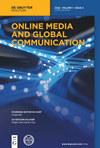CHATGPT与全球南方:撒哈拉以南非洲的记者如何参与生成式人工智能?
引用次数: 3
摘要
摘要研究目的本研究探讨了撒哈拉以南非洲记者对生成人工智能工具的使用,重点关注错误信息、剽窃、刻板印象和在线数据库的不代表性问题。这项研究将这一调查置于全球南方能否有效、公平地使用人工智能工具的更广泛辩论中。设计/方法/方法这项研究涉及对来自五个撒哈拉以南非洲国家的记者进行采访,即刚果、刚果民主共和国、肯尼亚、坦桑尼亚、乌干达和赞比亚。这项研究的目的是确定撒哈拉以南非洲的记者是如何利用ChatGPT的。值得注意的是,这项研究是正在进行的人工智能项目的一个组成部分,该项目于2022年9月19日在获得IRB批准后不久开始。在发现我们的参与者已经在使用聊天机器人后,ChatGPT项目于2023年1月启动。研究结果该研究强调,像ChatGPT这样的生成性人工智能在有限且不具代表性的非洲语料库上运行,使其对被视为文明和不文明的语言具有选择性,从而限制了其在该地区的有效性。然而,该研究也表明,在缺乏代表性语料库的情况下,像ChatGPT这样的生成性人工智能工具为有效的新闻实践提供了机会,因为记者不能完全依赖这些工具。实际影响该研究强调,人类机构需要向该工具提供相关信息,从而为全球数据库做出贡献,并在设计人工智能工具时考虑不同的数据来源,以最大限度地减少偏见和刻板印象。社会影响该研究的社会影响表明,人工智能工具对发展中国家的新闻业既有积极影响,也有消极影响,有必要促进在新闻业及其他领域负责任和合乎道德地使用人工智能工具。原创性/价值该研究的最初价值在于揭示新闻业中与人工智能相关的挑战和机遇,促进后殖民思维,并强调多样的数据来源和人类能动性在人工智能工具开发和使用中的重要性。本文章由计算机程序翻译,如有差异,请以英文原文为准。
CHATGPT and the Global South: how are journalists in sub-Saharan Africa engaging with generative AI?
Abstract Study purpose This study explores the usage of generative AI tools by journalists in sub-Saharan Africa, with a focus on issues of misinformation, plagiarism, stereotypes, and the unrepresentative nature of online databases. The research places this inquiry within broader debates of whether the Global South can effectively and fairly use AI tools. Design/methodology/approach This study involved conducting interviews with journalists from five sub-Saharan African countries, namely Congo, DRC, Kenya, Tanzania, Uganda, and Zambia. The objective of the study was to ascertain how journalists in sub-Saharan Africa are utilizing ChatGPT. It is worth noting that this study is a component of an ongoing project on AI that commenced on September 19, 2022, shortly after receiving IRB approval. The ChatGPT project was initiated in January 2023 after discovering that our participants were already employing the Chatbot. Findings The study highlights that generative AI like ChatGPT operates on a limited and non-representative African corpus, making it selective on what is considered civil and uncivil language, thus limiting its effectiveness in the region. However, the study also suggests that in the absence of representative corpora, generative AI tools like ChatGPT present an opportunity for effective journalism practice in that journalists cannot completely rely on the tools. Practical implications The study emphasizes the need for human agencies to provide relevant information to the tool, thus contributing to a global database, and to consider diverse data sources when designing AI tools to minimize biases and stereotypes. Social implications The social implications of the study suggest that AI tools have both positive and negative effects on journalism in developing countries, and there is a need to promote the responsible and ethical use of AI tools in journalism and beyond. Originality/value The original value of the study lies in shedding light on the challenges and opportunities associated with AI in journalism, promoting postcolonial thinking, and emphasizing the importance of diverse data sources and human agency in the development and use of AI tools.
求助全文
通过发布文献求助,成功后即可免费获取论文全文。
去求助
来源期刊

Online Media and Global Communication
Communication, Media Studies, Internet Studies, International Studies, International Relations-
自引率
0.00%
发文量
0
期刊介绍:
Online Media and Global Communication (OMGC) is a new venue for high quality articles on theories and methods about the role of online media in global communication. This journal is sponsored by the Center for Global Public Opinion Research of China and School of Journalism and Communication, Shanghai International Studies University, China. It is published solely online in English. The journal aims to serve as an academic bridge in the research of online media and global communication between the dominating English-speaking world and the non-English speaking world that has remained mostly invisible due to language barriers. Through its structured abstracts for all research articles and uniform keyword system in the United Nations’ official six languages plus Japanese and German (Arabic, Chinese, English, French, Russian, Spanish, Japanese, and German), the journal provides a highly accessible platform to users worldwide. Its unique dual track single-blind and double-blind review system facilitates manuscript reviews with different levels of author identities. OMGC publishes review essays on the state-of-the-art in online media and global communication research in different countries and regions, original research papers on topics related online media and global communication and translated articles from non-English speaking Global South. It strives to be a leading platform for scientific exchange in online media and global communication.
For events and more, consider following us on Twitter at https://twitter.com/OMGCJOURNAL.
Topics
OMGC publishes high quality, innovative and original research on global communication especially in the use of global online media platforms such as Facebook, TikTok, YouTube, Twitter, Instagram, WhatsApp, Weibo, WeChat, Wikipedia, web sites, blogs, etc. This journal will address the contemporary concerns about the effects and operations of global digital media platforms on international relations, international public opinion, fake news and propaganda dissemination, diaspora communication, consumer behavior as well as the balance of voices in the world. Comparative research across countries are particularly welcome. Empirical research is preferred over conceptual papers.
Article Formats
In addition to the standard research article format, the Journal includes the following formats:
● One translation paper selected from Non-English Journals that with high quality as “Gems from the Global South” per issue
● One review essay on current state of research in online media and global communication in a country or region
 求助内容:
求助内容: 应助结果提醒方式:
应助结果提醒方式:


